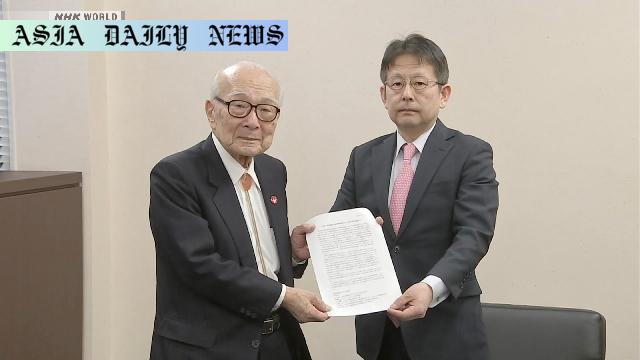Nuclear Weapons Ban: Survivors of Hiroshima and Nagasaki protest Japan’s decision to abstain from critical UN treaty conference.

Introduction: Japan’s Absence Sparks Controversy
Survivors of the atomic bombings of Hiroshima and Nagasaki, along with their supporters, have expressed sharp dissent over Japan’s decision to abstain from participating in a vital United Nations conference centered around the nuclear weapons ban treaty. This decision has sparked debates over Japan’s role as the only nation to have suffered nuclear devastation, and whether it is fulfilling its duty to champion global nuclear disarmament.
The Call for Responsibility: Survivors and Activists Take Action
On Wednesday, representatives from the Japan NGO Network for Nuclear Weapons Abolition, a coalition advocating for global nuclear disarmament, visited Tokyo’s Foreign Ministry to protest. Representing atomic bombing survivors, the network’s co-chair, Tanaka Terumi, voiced disappointment over the government’s absence at the conference. Survivors and activists stressed the imperative for Japan’s participation as a moral leader.
Why Japan Matters: The Nation’s Unique Role
As the only nation in history to endure a nuclear attack, Japan holds a unique, symbolic position in the fight against nuclear weaponry. Activists argue that this role obligates Japan to take a leading stance on disarmament. Tanaka, speaking with reporters, emphasized that the country must prioritize its position and serve as a prominent voice for nuclear abolition on the global stage.
Japan’s Position: Diplomatic Complexity
Official responses from the Japanese government have highlighted the challenges of participating in the UN nuclear weapons ban treaty conference. Nakamura Kimitake, head of the Foreign Ministry’s Disarmament, Non-Proliferation, and Science Department, justified Japan’s absence by citing the absence of nuclear-armed nations from the event. He argued that without broader global participation, the treaty’s measures would struggle to be effective.
Security vs. Disarmament: A Trade-Off
Japan’s Foreign Ministry underscored the country’s security concerns as a nation under the protective umbrella of the US nuclear arsenal. Officials maintain that the Treaty on the Non-Proliferation of Nuclear Weapons (NPT) remains the appropriate framework for advancing disarmament, as it incorporates nuclear-armed and non-nuclear states alike. Nevertheless, critics contend that Japan’s abstention sends mixed signals about its commitment to global peace and nuclear abolition.
Voices of Dissent: Survivors Demand Action
Atomic bomb survivors are adamant in their belief that Japan must leverage its unparalleled perspective on the devastating consequences of nuclear weapons. Tanaka pointed out the government’s responsibility to actively participate in international forums and promote its stance as an atomic-bombed country. He dismissed claims about diplomatic difficulty, calling for the nation to uphold its moral duty despite challenges.
Global Implications: The Role of Leadership
Japan’s decision not to attend the UN nuclear weapons ban treaty conference has far-reaching implications. As a prominent global economy and a nation with a tragic history tied to nuclear warfare, Japan’s leadership (or lack thereof) in these discussions informs the tone and direction of global disarmament efforts. The question remains whether Japan can strike a balance between its security imperatives and its role as a moral leader.
Conclusion: A Divided Path
Japan’s current strategy reflects the complexities of navigating modern geopolitical threats and historical responsibilities. While the government defends its absence on strategic grounds, survivors of Hiroshima and Nagasaki continue to advocate for unwavering support of nuclear disarmament. The debate underscores the broader challenge of reconciling security concerns with a commitment to global peace.
Commentary
Historical Responsibility and Global Expectations
Japan’s history as the only nation to experience nuclear warfare places it in a uniquely poignant position on the world stage. This history comes with an undeniable responsibility to ensure that such tragedies are never repeated. The absence of Japan from the nuclear ban treaty conference is therefore perplexing to many, as it represents a missed opportunity for moral leadership.
The Dilemma of Security and Morality
Balancing security needs with moral responsibilities is undeniably challenging for Japan. As a nation relying on the United States for its nuclear deterrent, Japan faces political and strategic constraints. However, these constraints should not overshadow its historical legacy and the voices of its own citizens who suffered the effects of nuclear devastation. Failure to address these discrepancies risks undermining Japan’s credibility and leadership in advocating for peace.
A Call for Bold Diplomacy
Japan stands at a crossroads. Opting for pragmatic diplomacy should not preclude moral advocacy, especially at critical junctures like the nuclear weapons ban treaty conference. Powerful advocacy on forums like this would allow Japan to harness its unique historical narrative in service of a global disarmament cause, striking a balance between its security imperatives and its moral obligations.
Conclusion: The Path Forward
As appeals from Hiroshima and Nagasaki survivors demonstrate, the desire for Japan to take on a proactive role persists. Bold action at international forums, coupled with strategic navigation of alliances, could transform Japan into a cornerstone of the nuclear disarmament movement. This would not only honor its history but also pave the way for more unified global action against nuclear threats.


